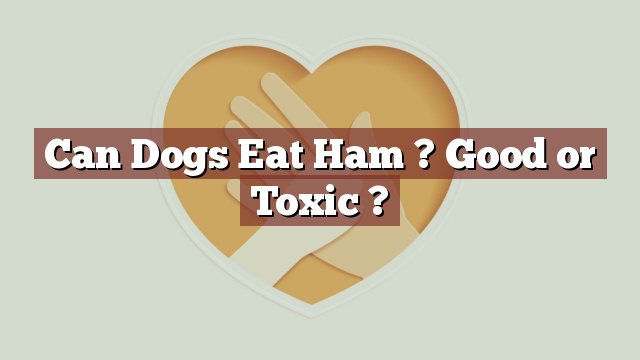Can Dogs Eat Ham? Good or Toxic?
As pet owners, it is essential to be aware of the foods that are safe for our furry friends to consume. Can dogs eat ham? This is a question that often arises when we are enjoying a delicious ham sandwich or preparing a holiday feast. In this article, we will explore the nutritional value of ham, examine the safety of this meat for dogs, discuss potential risks or benefits, and provide guidance on what to do if your dog has consumed ham.
Nutritional Value of Ham: What Does it Offer to Dogs?
Ham is a type of processed meat that is derived from pork. It is known for its savory taste and is commonly enjoyed by humans. From a nutritional perspective, ham is a good source of protein, vitamins, and minerals. It contains essential amino acids that support muscle growth and repair. Additionally, ham provides B vitamins, zinc, and iron, which are important for maintaining overall health.
Can Dogs Eat Ham? Understanding the Safety of This Meat.
Can dogs eat ham? The answer is not a straightforward one. While ham is not inherently toxic to dogs, there are certain factors to consider before sharing this meat with your furry companion. One of the main concerns with feeding ham to dogs is its high sodium content. Excessive sodium intake can lead to dehydration, electrolyte imbalances, and even sodium poisoning in severe cases. Furthermore, the preservatives and additives present in processed ham can be harmful to dogs.
Potential Risks or Benefits: Examining the Impact of Ham on Dogs.
When it comes to the potential risks and benefits of dogs consuming ham, it is crucial to weigh both sides. On one hand, the protein content in ham can be beneficial for dogs, especially those with high energy needs. However, the high sodium and fat content in ham can pose health risks, particularly for dogs with underlying health conditions such as heart problems or kidney disease. It is important to remember that dogs have different dietary requirements than humans, and their bodies may not tolerate certain foods as well.
My Dog Ate Ham, What Should I Do? Steps to Take and Warning Signs.
If your dog has consumed ham, it is essential to observe their behavior and monitor for any signs of distress or illness. Some common warning signs of a negative reaction to ham include vomiting, diarrhea, excessive thirst, lethargy, and loss of appetite. If you notice any of these symptoms, it is best to contact your veterinarian for guidance. They may recommend monitoring your dog at home or bringing them in for a check-up, depending on the severity of the symptoms.
Conclusion: The Verdict on Dogs Consuming Ham – Proceed with Caution.
In conclusion, the question of whether dogs can eat ham does not have a definitive answer. While ham can provide some nutritional benefits, it also carries potential risks, mainly due to its high sodium and fat content, as well as the presence of additives. Before sharing ham with your furry friend, it is crucial to consider their individual health needs and consult with your veterinarian. As a responsible pet owner, it is always better to err on the side of caution and choose safer alternatives for your dog’s diet.
Thank you for investing your time in exploring [page_title] on Can-Eat.org. Our goal is to provide readers like you with thorough and reliable information about various dietary topics. Each article, including [page_title], stems from diligent research and a passion for understanding the nuances of our food choices. We believe that knowledge is a vital step towards making informed and healthy decisions. However, while "[page_title]" sheds light on its specific topic, it's crucial to remember that everyone's body reacts differently to foods and dietary changes. What might be beneficial for one person could have different effects on another. Before you consider integrating suggestions or insights from "[page_title]" into your diet, it's always wise to consult with a nutritionist or healthcare professional. Their specialized knowledge ensures that you're making choices best suited to your individual health needs. As you navigate [page_title], be mindful of potential allergies, intolerances, or unique dietary requirements you may have. No singular article can capture the vast diversity of human health, and individualized guidance is invaluable. The content provided in [page_title] serves as a general guide. It is not, by any means, a substitute for personalized medical or nutritional advice. Your health should always be the top priority, and professional guidance is the best path forward. In your journey towards a balanced and nutritious lifestyle, we hope that [page_title] serves as a helpful stepping stone. Remember, informed decisions lead to healthier outcomes. Thank you for trusting Can-Eat.org. Continue exploring, learning, and prioritizing your health. Cheers to a well-informed and healthier future!

